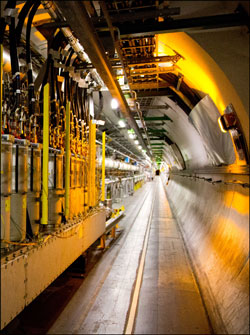Jan 25 2014
Research at CERN receives 6.685 million Danish kroner from NUFI, the National Committee for Research Infrastructure under the Danish Agency for Science, Technology and Innovation. The funds are granted for the operation and the development of the Danish experimental work at CERN in 2014.
 The LHC is designed as a 27-kilometer circular tunnel located between 40 and 170 meters below the earth's surface. The tunnel is below the French-Swiss border near Geneva.
The LHC is designed as a 27-kilometer circular tunnel located between 40 and 170 meters below the earth's surface. The tunnel is below the French-Swiss border near Geneva.
Particle physicists study the fundamental constituents of matter and their interactions. They seek to unravel what the universe was made up of in the first nanoseconds after the Big Bang, the Quark Gluon Plasma, and are searching for new particles, for example, candidates for dark matter and supersymmetry.
The experiments are carried out at CERN, the European Organization for Nuclear Research in Geneva, Switzerland, where the 27 km long underground particle accelerator, the Large Hadron Collider (LHC), operates at tremendously high energies.
Danish physics groups contribute to several of the large international experimental collaborations at CERN and the funding of 6.685 million Danish kroner is being given for ‘research supporting activities related to the National Instrument Center for CERN Experiments (NICE)’.
The activities include the operation and development of the ALICE and ATLAS experiments, anchored at the Niels Bohr Institute, University of Copenhagen and the fixed target experiments, ISOLDE, ASACUSA and ALPHA, which are anchored at Aarhus University.
“The first three years of experiments at the LHC led to, among other things, the momentous discovery of the Higgs particle. This discovery led to the award of the 2013 Nobel Prize in Physics to theorists F. Englert and P. Higgs, who in 1964 predicted the mechanism of mass generation by spontaneous symmetry breaking and the existence of a new boson, which has since just been called the Higgs boson. The Large Hadron Collider is currently being upgraded to allow for collisions at twice the present energy and the complex will start again at the beginning of 2015,” explains Jens Jørgen Gaardhøje, professor of experimental subatomic physics at the Niels Bohr Institute at the University of Copenhagen.
A series of experiments at lower energies using fixed target reactions focus on studying exotic nuclear reactions using radioactive nuclei, which are relevant for many astrophysical processes, and producing and studying antihydrogen.